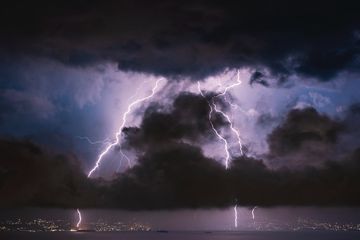Climate change or global warming refers to the changes in Earth's climate caused by a man-made excess of greenhouse gases like CO₂ in the atmosphere.
Defining Climate Change
Climate change traditionally refers to the constant, natural fluctuations in Earth’s climate, however recently has become the common term for the man-made, rapid changes happening since the Industrial Revolution. Other names include ‘global warming’, ‘the climate crisis’ and ‘the climate emergency’. Due to human activities - like burning fossil fuels - an excess of greenhouse gases accumulated in the air over time trapping heat in the atmosphere resulting in an overall warming effect. This increasing average temperature provokes severe changes in the climate as we know it.
Our Ever Changing Climate
In Earth’s history the climate has always varied and thanks to modern science we are able to calculate how it has changed in the last few million years. There were mild periods like the one we are in at the moment, but also states in which giant ice sheets covered the northern continents. Not only the extent but also the suddenness of transformation between these conditions is impressive. Over longer time periods, the climate changed even more radically. Around 50 million years ago Earth was free of ice, but there were also times, where it was almost completely covered - snowball earths. Those snowball earths alternated with exceptionally hot climates.
The ice age cycles from the last 3 million years were caused by periodic oscillations of Earth’s rotation and orbit, which lead to changes in the distribution of sun light. That means ice ages happen when little sunlight falls over the poles, and consequently not as much ice melts as otherwise would have. With more ice, more sunlight is reflected back and that causes the cooling. This happens in time scales much larger than human time frames.
Earth’s rotations and distance to the sun are not the only factors determining the climate, Earth’s atmosphere has a profound impact on the climate as well. Greenhouse gases have a warming effect due to their radiative characteristics. In a nutshell the higher their quantity, the warmer the planet. Those gases are regulated as natural processes produce but also sequester greenhouse gases in a cycle. In those controlled quantities, greenhouse gases have an important role for life on Earth by keeping our planet warm and in a habitable temperature.
Man-made Climate Change
Human activities are producing and releasing greenhouse gases into the atmosphere in vast quantities since the Industrial Revolution. Happening at a pace too fast for natural processes to regulate, this is causing a growing excess of those gases trapping infrared radiation and heating up our planet.
The greenhouse gases mainly responsible for the climate crisis are methane (CH₄) a product of livestock farming and landfills; nitrous oxide (N₂O) from agriculture, fossil fuel combustion and industrial processes; and the main contributor, carbon dioxide (CO₂). CO₂ is generated in particular by the burning of fossil fuels that send large quantities of gases into the atmosphere. Unfortunately in the last 300 years our society has burned an increasing amount of coal, oil and gas for electricity, industry and transport, emitting more gases than Earth is naturally able to deal with.
Effects of Global Warming
The rapid temperature increase has catastrophic consequences including:
- loss of biodiversity due to limited adaptability of wildlife;
- food and water shortage resulting in hunger and water crisis;
- rising sea levels eradicating vast areas of habitats for humans and wildlife;
- higher health risks due to increasing spread of pests and pathogens, but also heat waves and increasing temperatures;
- increase in frequency and severity of extreme weather events such as hurricanes, flooding, heavy precipitation and droughts;
- immense biodiversity and food source loss due to ocean acidification;
- disappearing of glaciers and ice sheets on the poles;
Some of these consequences are causing an additional increase of the temperature, which can lead to an uncontrolled upwards spiral of an increasing temperature (runaway feedback). For example the melting of the massive ice covers, which have an essential cooling effect by reflecting sun rays back to space, will heat up the temperature even more. Or the growing amount of water vapour in the atmosphere - gaseous H₂O is a greenhouse gas - traps heat and thus warms the planet even more. These reactions will make the planet increasingly hotter (positive feedback loop) and in an extreme future may end up in a super hot, uninhabitable earth. Due to the runaway greenhouse effect the oceans on Venus that once existed have now evaporated and made Venus uninhabitable. Climate change is an enormous danger to us all.
Fighting the Climate Crisis
To fight this crisis we have to stop producing greenhouse gases and take the excess, which we have already produced, back out of the air. Every person has to switch to a more sustainable life causing less emissions and a smaller carbon footprint now, with the ultimate end goal living carbon neutral - a life producing no greenhouse gases. Unfortunately this is only one side of the coin, as those actions do nothing to address the existing excess of CO₂ and the other greenhouse gases in the atmosphere. To tackle this and undo the existing damage, we must start removing carbon dioxide from the air - this is where we - Carbon Removed - come in to help.

